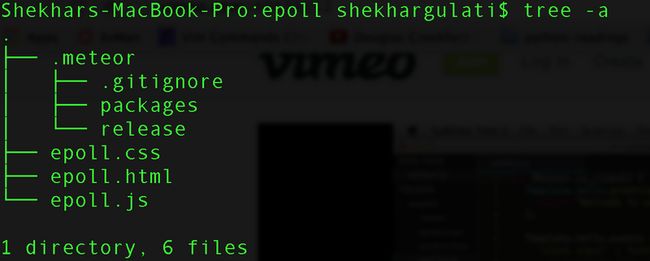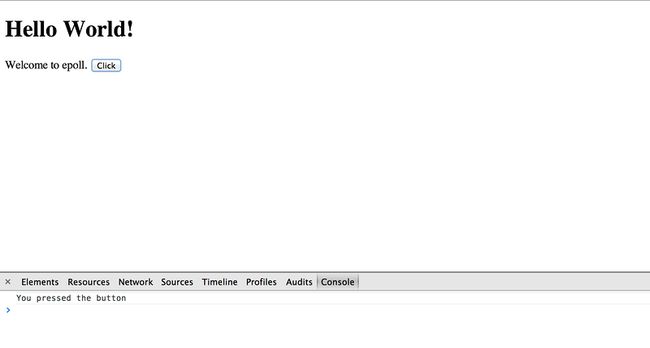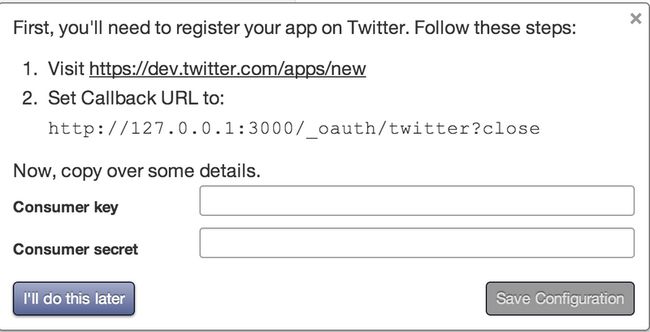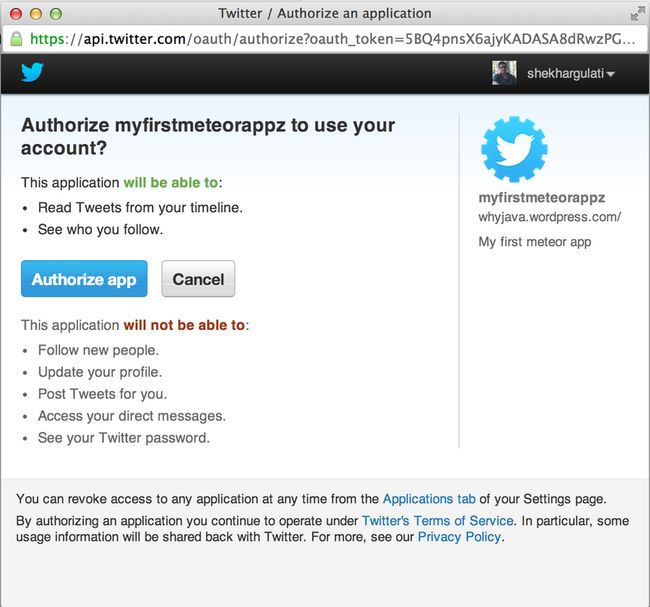编者注:我们发现了有趣的一系列文章《30天学习30种新技术》,正在翻译中,一天一篇更新,年终礼包。下面是第15天的内容。
到目前为止我们讨论了Bower、AngularJS、GruntJS和PhoneGap等JavaScript技术。今天是“30天学习30种新技术”挑战的第15天,我决定重返JavaScript,学习Meteor框架。虽然Meteor的文档相当好,但是它缺少为初学者准备的教程。我觉得教程的学习效果更好,因为教程可以帮助你快速上手一种技术。本文将介绍如何利用 Meteor 框架构建一个epoll应用。

Meteor是什么?
Meteor是新一代的开发即时web应用的开源框架,它能帮助你在最少的时间内完成开发。它的理念和AngularJS、BackboneJS等框架大不相同。当我们在backbone 和 angular 上工作时,客户端(Angular或Backbone)和REST后端通讯。我们可以用任何技术写 REST 后端,例如 Java、NodeJS、PHP。
Meteor使用DDP(分布式数据协议)在客户端和服务器间传送数据。客户端JavaScript开发者需要解决的首要问题是:向后端的数据库发起查询,发送数据到客户端,当数据库变动时,推送变动到客户端。DDP是解决这一问题的标准做法。
Meteor应用的后端基于Node和MongoDB。前端和后端的应用同时使用Meteor的API。未来开发者可以选择 MongoDB 之外的其他数据库。
为什么使用Meteor?
请阅读Meteor的七大原则。
应用案例
本文中我们将搭建一个 epoll 应用,该应用允许用户发布问题并投票。这个应用可以做到:
当用户访问
/时,会看到一个问题列表。用户需要通过Twitter登录,以便投票或发布新问题。如下图所示,由于未登录,投票按钮不可用。

当用户点击
Sign in with Twitter之后,他将授权 epoll 应用使用他的账号。授权成功之后,用户可以投票或发布新问题。

GitHub仓库
今天的示例应用的代码可以从GitHub取得。
安装Meteor
开始使用Meteor很容易。如果你使用Mac或Linux,只需输入如下命令:
curl https://install.meteor.com | /bin/sh
Windows用户请参阅文档
创建Meteor应用
创建Meteor应用很容易。安装之后,运行create命令即可。
meteor create epoll
这将创建epoll目录,该目录下有一些模板文件。项目结构如下所示:

让我们解释下这个结构:
meteor文件夹下保存meteor特定的文件。
.gitignore忽略存储MongoDB数据库文件和应用文件的local文件夹。packages指明本应用所需的包。你可以把它们看成是npm包。Meteor以包的形式提供功能。本文中会使用一些包。release保存了meteor版本。本文使用的版本是0.6.6.3。epoll.css决定应用的CSS样式。epoll.html是应用的HTML标记。目前meteor只支持handlebars模板引擎,不过未来可能支持其他模板引擎。epoll.js是meteor应用的核心。epoll.js同时部署在服务器段和客户端。这允许开发者一次编写、两端使用。meteor创建的epoll.js模板如下所示:
if (Meteor.isClient) {
Template.hello.greeting = function () {
return "Welcome to epoll.";
};
Template.hello.events({
'click input' : function () {
// template data, if any, is available in 'this'
if (typeof console !== 'undefined')
console.log("You pressed the button");
}
});
}
if (Meteor.isServer) {
Meteor.startup(function () {
// code to run on server at startup
});
}
Meteor.isServer和Meteor.isClient区分了服务器端和客户端的代码。
meteor命令可以运行应用:
cd epoll
meteor
可以通过 http://localhost:3000 访问应用。点击按钮后,在chrome developer tools中你可以看到You pressed the button.信息。

修改epoll.js的欢迎部分:
Template.hello.greeting = function () {
return "The Missing Meteor Tutorial!!!";
};
MongoDB在哪?
前面提到Meteor使用MongoDB来存储数据。当我们安装meteor的时候,它同时会下载最新版的MongoDB。我们可以看到,MongoDB安装在ps -ef可以找到MongoDB的安装位置。
; ps -ef|grep mongo
501 1704 1687 0 2:22PM ttys001 0:09.28 /Users/shekhargulati/.meteor/tools/0b2f28e18b/mongodb/bin/mongod --bind_ip 127.0.0.1 --smallfiles --nohttpinterface --port 3002 --dbpath /Users/shekhargulati/day15/epoll/.meteor/local/db
在我的机子上,MongoDB运行于3002端口,以避免和其他默认运行于27017端口的MongoDB冲突。
智能的Meteor包管理
前面提到Meteor以包的形式实现功能。这些包在浏览器和服务器上都能使用。运行以下命令可以得知Meteor支持的所有包:
meteor list
使用meteor add和meteor remove命令来添加删除包。
添加Twitter Bootstrap包
我们将使用Twitter Bootstrap作为用户界面的风格。
meteor add bootstrap
注意,Meteor包不一定是最新版。
添加Twitter授权包
在我们的应用中,用户需要首先通过Twitter授权才能投票或添加问题。Meteor提供了accounts-ui包,可以为我们的应用添加登录组件:
meteor add accounts-ui
然后我们添加授权提供者。在这个应用中,我们使用Twitter,不过我们其实也可以使用facebook、github、google、weibo或meetup。
meteor add accounts-twitter
添加包之后,我们需要更新下epoll.html,添加Twitter登录按钮:
Epoll : Share your opinion online, anywhere, anytime
{{> banner}}
Sign in using Twitter to submit new questions or to vote on existing questions.
{{loginButtons}}
然后调整一下样式,增加下面的代码到epoll.css:
/* CSS declarations go here */
.login-display-name{color: white }
.login-button{background-color: white}
#main {
padding-top:20px;
}
现在点击Configure Twitter Login,会要求我们输入 twitter 应用的相关信息:

MongoDB会在用户集合内创建新用户。我们可以使用mongo命令连接数据库查看:
; ~/.meteor/tools/0b2f28e18b/mongodb/bin/mongo --port 3002
MongoDB shell version: 2.4.6
connecting to: 127.0.0.1:3002/test
> show dbs
local 0.03125GB
meteor 0.0625GB
> use meteor
switched to db meteor
> show collections
meteor_accounts_loginServiceConfiguration
system.indexes
users
> db.meteor_accounts_loginServiceConfiguration.find()
{ "service" : "twitter", "consumerKey" : "xxx", "secret" : "xxx", "_id" : "xxx" }
>
>
> db.users.find().pretty()
{
"createdAt" : ISODate("2013-11-11T18:03:23.488Z"),
"_id" : "xx",
"services" : {
"twitter" : {
"id" : "66993334",
"screenName" : "shekhargulati",
"accessToken" : "xxx-xxx",
"accessTokenSecret" : "xxx",
"profile_image_url" : "http://pbs.twimg.com/profile_images/378800000254412405/e4adcf8fb7800c3e5f8141c561cb57e4_normal.jpeg",
"profile_image_url_https" : "https://pbs.twimg.com/profile_images/378800000254412405/e4adcf8fb7800c3e5f8141c561cb57e4_normal.jpeg",
"lang" : "en"
},
"resume" : {
"loginTokens" : [
{
"token" : "xxx",
"when" : ISODate("2013-11-11T18:03:23.489Z")
}
]
}
},
"profile" : {
"name" : "Shekhar Gulati"
}
}
>
定义应用层次
Meteor创建的模板应用有一个问题,客户端和服务器段的epoll.js代码是一样的。任何人的都可以使用浏览器的开发工具查看epoll.js。
如果我们不想将服务器端的特有代码发送到客户端,我们可以使用client和server目录来分隔代码。
cd epoll
mkdir client server
在两个目录下分别创建epollclient.js和epollserver.js文件。
client/epollclient.js内存放客户端代码:
Template.hello.greeting = function () {
return "The Missing Meteor Tutorial!!!";
};
Template.hello.events({
'click input' : function () {
// template data, if any, is available in 'this'
if (typeof console !== 'undefined')
console.log("You pressed the button");
}
});
服务器端代码存放在server/epollserver.js:
Meteor.startup(function () {
// code to run on server at startup
});
```
然后删除`epoll.js`:
```sh
rm -f epoll.js
移除insecure包
每一个Meteor应用预装了insecure包。这个应用让用户端可以在数据库上实施一切操作。对于原型开发这很有用,但是通常不适合生产环境。
meteor remove insecure
发布问题
现在我们添加一个功能,已登录的用户可以提交新问题。
Epoll : Share your opinion online, anywhere, anytime
{{#if currentUser}}
{{> addquestion}}
{{/if}}
{{#unless currentUser}}
{{> banner}}
{{/unless}}
Sign in using Twitter to submit new questions or to vote on existing questions.
{{loginButtons}}
仅当用户登录的时候才会渲染addQuestion模板。如果用户登出,则不会见到添加新问题的文本框。
我们需要同时更新客户端和服务器端的代码以便实现这一功能。
在client/epollclient.js中加入:
Template.addquestion.events({
'click input.add-question' : function(event){
event.preventDefault();
var questionText = document.getElementById("questionText").value;
Meteor.call("addQuestion",questionText,function(error , questionId){
console.log('added question with Id .. '+questionId);
});
document.getElementById("questionText").value = "";
}
});
以上代码中:
我们首先将点击
input事件绑定到add-question类。接着我们阻止默认的点击事件,从DOM中获取问题文本。
然后我们调用Meteor服务器的方法
addQuestion。由服务器负责插入、更新、删除数据等有风险的操作。客户端看不到实现,也无法私自修改数据。
现在我们需要修改server/epollserver.js。我们首先定义一个名为Questions的新集合。然后我们会操作这个集合。Meteor使用minimongo作为API接口。参阅Meteor.Collection.documentation查看minimongo支持的所有操作。
Questions = new Meteor.Collection("questions");
Meteor.startup(function () {
// code to run on server at startup
});
Meteor.methods({
addQuestion : function(questionText){
console.log('Adding Question');
var questionId = Questions.insert({
'questionText' : questionText,
'submittedOn': new Date(),
'submittedBy' : Meteor.userId()
});
return questionId;
}
});
查看下MongoDB中的数据
> db.questions.find().pretty()
{
"questionText" : "Is Sachin Tendulkar the greatest batsman of all time?",
"submittedOn" : ISODate("2013-11-11T18:23:02.541Z"),
"submittedBy" : "Jnu6oXoAZ2um57rZ8",
"_id" : "nhqvgDcZqgZgLdDB7"
}
问题列表
我们接下来要实现的功能是问题列表。用户不需登录,就可以看到所有问题的列表。
在main div中加入:
{{> questions}}
然后添加问题模板:
All Questions
{{#each items}}
{{> question}}
{{/each}}
{{questionText}}
Yes {{yes}}
No {{no}}
注意我们使用了unless来确保用户未登录的情况下应用disabled css。
为了获取所有问题,我们需要在客户端使用Question集合来获取所有文本。在client/epollclient.js添加如下代码:
Questions = new Meteor.Collection("questions");
Template.questions.items = function(){
return Questions.find({},{sort:{'submittedOn':-1}});
};
实现投票功能
最后我们需要实现投票功能。我们上面已经在html文件中加入了相关的模板代码,下面我们在client/epollclient.js加入如下代码:
Template.question.events({
'click': function () {
Session.set("selected_question", this._id);
},
'click a.yes' : function (event) {
event.preventDefault();
if(Meteor.userId()){
var questionId = Session.get('selected_question');
console.log('updating yes count for questionId '+questionId);
Meteor.call("incrementYesVotes",questionId);
}
},
'click a.no': function(){
event.preventDefault();
if(Meteor.userId()){
var questionId = Session.get('selected_question');
console.log('updating no count for questionId '+questionId);
Meteor.call("incrementNoVotes",questionId);
}
}
});
上面的代码实现了:
绑定点击事件到问题模板。点击任意问题的时,在
session中设置questionId。session提供了一个客户端的全局对象,你可以在里面存储任意的键值对。当用户点击Yes按钮时,我们会从
session中取得选中的questionId,然后在服务器端调用incrementYesVotes方法。我们使用Meteor.userId()来确保用户已经登录了。当用户点击No按钮时,我们在服务器端调用
incrementNoVotes函数。
最后我们在server/epollserver.js加入incrementYesVotes和incrementNoVotes函数。我们使用Meteor的集合更新功能来增加计数器。
incrementYesVotes : function(questionId){
console.log(questionId);
Questions.update(questionId,{$inc : {'yes':1}});
},
incrementNoVotes : function(questionId){
console.log(questionId);
Questions.update(questionId,{$inc : {'no':1}});
}
这样每次用户点击yes或no按钮之后,计数器会更新。你可以访问 http://localhost:3000 试验一番。
部署Meteor应用
部署Meteor应用有很多种方法。我们可以在Meteor提供的测试服务器上部署,也可以部署到OpenShift。
如果你打算部署到OpenShift上,请参阅Ryan的这篇博客。
运行以下命令可以部署到Meteor测试服务器:
meteor deploy epoll
应用可以通过 http://epoll.meteor.com/ 访问。
今天就是这些了。欢迎继续反馈。
原文:Day 15: Meteor——Building a Web App From Scratch in Meteor
翻译整理: Segmentfault




